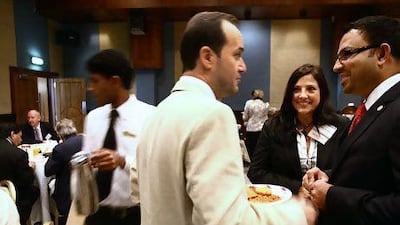It is 7am sharp at The Club in Abu Dhabi and Anna Heystek is clinking her water glass to usher nearly 30 business professionals to their seats.
To an outsider, this may seem like another tired business networking event. But at meetings under BNI, which says it is the world's largest business networking organisation with more than 5,800 chapters, including more than 10 in the UAE, the next 90 minutes will be carefully structured, recorded and monitored.
"This is a measured and systematic approach to networking," says Ms Heystek, the chief executive of the human resource consultancy goBlue International and BNI's chapter director in Abu Dhabi. "It's less about being social. There's a result in the end."
Most networking events conclude the same way, with a few swapped business cards and lots of time wasted in idle chitchat. But at BNI, members can hardly afford to squander a morning because they need a return on their sizable investment - in Abu Dhabi, members pay a one-off fee of Dh625 (US$160) plus annual dues of Dh3,800.
Meetings begin promptly on time and members are asked to leave if they miss three meetings in six months. All sorts of measures are tracked and scored according to a scale, from a person's tardiness and absenteeism to how much business they help bring in for their peers.
That is also why early into a meeting, every business member has 60 seconds to introduce who they are, what his or her firm does and the kinds of "referrals" it needs to generate future business. (Visiting executives hoping to join BNI's second chapter in Abu Dhabi, which launches in March, had just 30 seconds).
Blather on about your business by even a second too long and an alarm clock will go off to remind you to shorten your pitch. The referrals needed on this particular day run the gamut. One florist is seeking an introductory contact at a large private events company, while a representative from a car rental company simply needs new customers.
A third request is more targeted: Shaik Hamdan, the chief executive of the tech firm Emirates Net Systems, is looking for an introduction at a specific company that is getting an influx of new projects.
Mr Hamdan's goal is to secure a face-to-face meeting and offer some of his own company's products and services. Situations like this are precisely why he joined.
"BNI, in that way, is very powerful," Mr Hamdan says.
The organisation's philosophy centres on the concept of "givers gain" and that if you provide business to someone else, you will get business in return. In other words, says Bijay Shah, the national director of BNI Middle East, "what goes around, comes around".
Asking for help is one thing, but how successful have these businesses been at getting it? Over the past six months, members of the Abu Dhabi chapter passed an average of 33 referrals a week and accumulated Dh14.8 million in business for one another, according to the group's calculations. On this particular day, Mr Hamdan achieved the referral he was looking for.
The social pressure to assist other members certainly helps drive up these figures. Each week, members get called upon to hand out whatever leads they were able to generate based on last week's requests, by slipping pieces of paper with contacts' names and phone numbers to their peers who asked for them. One by one, members get up and either announce they have a contact to share, which causes the room to erupt into an approving round of applause, or confess they came up dry. When it is the latter, the room is eerily silent.

